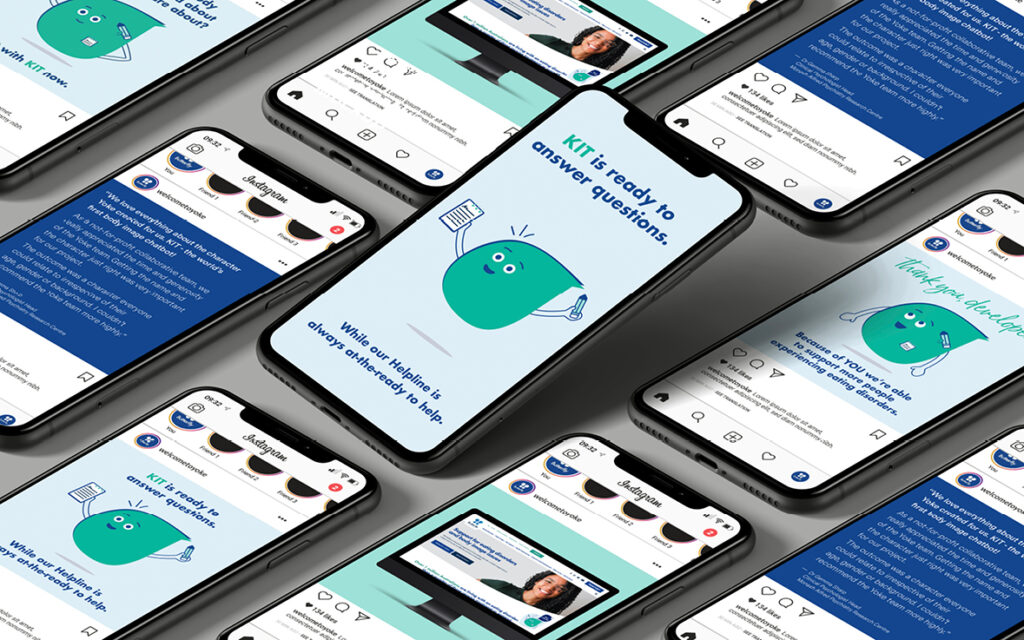Changing the chatter on body image with ‘KIT’ the Chatbot

Changing the chatter on body image with ‘KIT’ the Chatbot
The COVID-19 pandemic has had devastating impacts on people struggling with body image issues and eating disorders. A new world-first chatbot, launched in collaboration with the Butterfly Foundation, is providing much needed support to these people and their loved ones.
The chatbox is providing hope to the one in three young people in Australia are concerned about their body image. Poor body image is a major risk factor for the development of eating disorders which affect more than 1 million Australians. These disorders are commonly misunderstood as a “diet gone too far” or an issue of “vanity”. In reality, these are serious disorders which are the deadliest of all mental illnesses. They impact people of all ages, genders, and backgrounds, not just young girls.
Despite eating disorders being prevalent, less than one in four people seek appropriate treatment in their lifetime.
Even if more people decide to take that crucial first step of seeking support, the current eating disorder support services are so overwhelmed due to the COVID-19 pandemic that people are not getting help as quickly as they need, and often not at all.
It was these statistics that inspired me to try to fill this gap in service provision and reach the greater than 75 per cent of people who never seek treatment.
People are spending more time online than ever before during the COVID-19 pandemic for study, work and leisure, and this includes a lot of time on social media. Photo-based activities on social media like posting selfies and looking at other people’s photos can be very problematic for body image.
Social media represents the key battleground to prevent and intervene in the development of negative body image which can lead to eating disorder and other mental health issues. I wanted to provide people with 24/7 evidence-based support in the place they needed it most – on social media. This is how KIT the positive body image chatbot was born.
A chatbot is a computer program that can learn to have human-like conversations using artificial intelligence technology. This technology has been used in the commercial sector for decades, but chatbots have only recently started to be used in the field of mental health with KIT representing a world-first chatbot in the field of body image. Chatbots allow people to be anonymous and represent that “in between” step from deciding to seek help and actually speak with a health professional.
KIT can never replace the support from a health professional. However, KIT provides simple information and encourages people to contact the Butterfly Foundation Helpline service for more in-depth support.
KIT has been developed in collaboration with Australia’s national body image and eating disorder support organisation, the Butterfly Foundation, as well as technical partners, Proxima.
The chatbot offers two types of conversations:
(1) education-based conversation about the causes and consequences of body image issues and eating disorders, and
(2) teaching coping skills or strategies that mental health professionals routinely offer.
The chatbot conversation has been co-designed with young people and parents/carers to ensure that the style and tone of KIT’s conversation is relatable across the gender, age and background spectrum. The feedback on the chatbot has been very positive from both groups.
One young person who identified as gender diverse said, “To me, KIT felt like non-binary, and I know it’s like a ridiculous thing, but I felt seen by this little character.”
The parents/carers also appreciate the ease of use and accessibility of KIT. A mother of a teenage girl with an eating disorder said, “To have something that people can use 24/7 is really important when they can’t access any other help or just to get ideas of where to go.”
KIT was officially launched on the Butterfly Foundation website and Facebook Messenger services in November 2020. In the six months following, KIT chatted with more than 10,000 people seeking help for themselves or for a loved one.
The KIT team is thrilled that so many people are using and benefitting from our chatbot’s advice. What is especially heartening is the diversity of people using KIT – people from demographics who do not traditionally seek support.
I encourage everyone to use the chatbot because KIT learns more from each conversation. We use this information to keep improving KIT’s conversational abilities so we can better help the millions of people struggling with body image and eating issues in Australia and beyond.
The KIT chatbot project has been funded by grants from the following organisations: AMP Foundation, Bupa Health Foundation, Cooperative Research Centres Association, and Monash University. If you are interested in supporting this project, contact Dr Gemma Sharp on gemma.sharp@monash.edu.
The research article, ‘Development of a Positive Body Image Chatbot (KIT) With Young People and Parents/Carers: Qualitative Focus Group Study’, was published in the Journal of Medical Internet Research. To download a copy, visit https://www.jmir.org/2021/6/e27807/
- This story addresses eating disorders. If this raises any concerns for you or a loved one, please contact the Butterfly Helpline on 1800 33 4673.





